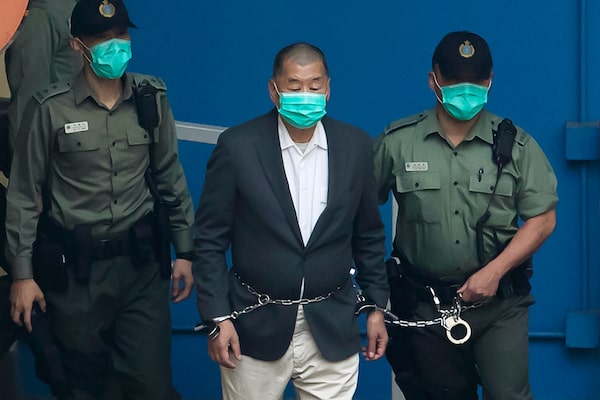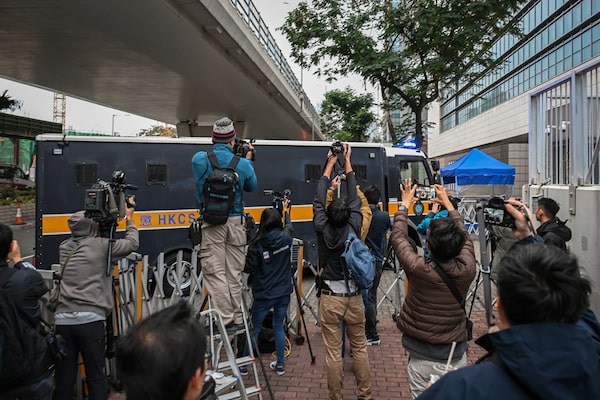Police officers stand guard outside the West Kowloon Magistrates' Courts during the national security trial of media mogul Jimmy Lai, founder of Apple Daily, in Hong Kong, China on Dec. 18, 2023.LAM YIK/Reuters
For weeks now, prosecutors in Hong Kong have been laying out a case against Apple Daily publisher Jimmy Lai which his legal team says amounts to conspiracy to commit journalism.
Mr. Lai has been charged with sedition and breaching Hong Kong’s national security law. The prosecution’s star witness, Andy Li – whom supporters claim was tortured in custody – is expected to tie Mr. Lai into an alleged global conspiracy to undermine China and provoke anti-government unrest. He is expected to testify in March.
But the first stage of the trial has been focused on the sedition charges, hearing from Mr. Lai’s former colleagues at Apple Daily, a pro-democracy tabloid he founded in 1995 prior to the then-British-colony’s handover to China. Former employees testified Mr. Lai directed coverage, dictated headlines and commissioned prominent figures to write op-eds.
“These are allegations of ‘newspaper reports news,’ ” said Caoilfhionn Gallagher, a member of Mr. Lai’s international media team. In court this week, his lawyer Robert Pang said Apple Daily did not “criticize simply for the sake of criticizing, but in the hope that by drawing attention to these matters, the government would change its policies.”

Jimmy Lai is escorted by Correctional Services officers to get on a prison van before appearing in a court in Hong Kong, on Dec. 12, 2020.Kin Cheung/The Associated Press
Prosecutors say Mr. Lai used “seditious publications in an attempt to sway public opinion,” including encouraging people to take to the streets and inciting hatred of the Hong Kong and Chinese governments.
The use of colonial-era sedition legislation against Mr. Lai, as in a similar case involving pro-democracy website Stand News, has alarmed many journalists in the city. Unlike the national security law, which, while broad in scope, is relatively easy for the media to navigate, “sedition is different,” said Francis Lee, a journalism professor at the Chinese University of Hong Kong.
“Anything that arouses hatred against the government can potentially be seditious,” he told the Taiwan-based research group China Media Project this week. “And basically, that means that whenever the news media tries to perform its watchdog role, it’s potentially in the grey area.”
Hong Kong’s current sedition legislation dates to 1938 and refers to inciting “disaffection against the person of His Majesty.” But it’s about to get a big update: Wednesday marked the end of a 30-day public consultation period for a new security law designed to “fill in the gaps” left by the one imposed on the city by Beijing in 2020.
The proposed legislation, known as Article 23, sets out seven offences, including treason, espionage, theft of state secrets and “acts with seditious intention.”
“Many of these proposed provisions are vague and criminalize people’s peaceful exercises of human rights, including the rights to freedom of association, assembly, expression and the press,” a group of 80 civil society groups said in a submission on the law organized by British-based Hong Kong Watch.
In a statement, the Hong Kong Journalists Association warned the law “will have profound and far-reaching implications on the press,” and said the sedition offence in particular “could further stifle speech and press freedom.” More than 90 per cent of association members said the law would significantly affect their work.

Journalists film a prison van carrying activist publisher Jimmy Lai as it enters the West Kowloon Magistrates' Courts where Lai's trial takes place in Hong Kong, on Jan. 2.Billy H.C. Kwok/The Associated Press
Since 2020, hundreds of Hong Kong journalists have left the city, which has plummeted in international rankings of press freedom. Foreign media, too, have come under more scrutiny, with journalists renewing or applying for employment visas asked to provide years-worth of examples of their work and some refused entry without explanation.
Association chairman Ronson Chan said he feared Article 23 could further “change the atmosphere” in Hong Kong, prompting journalists to self-censor and making people afraid to speak to the media. Even before the law has come into force, local broadcaster TVB struggled to find people on the street willing to discuss it: One woman said she was scared as “one wrong sentence could be dangerous.”
Beyond the sedition offence, journalists have also expressed concern about what might constitute “theft of state secrets.” A similarly worded offence in China has been used to target reporters in the past, including Australian TV anchor Cheng Lei, released in October after three years in Chinese detention for allegedly sharing a government briefing document minutes before an official embargo lifted.
Mr. Chan said he hoped the government would listen to journalists’ concerns and introduce a public interest defence for the law, a call echoed by the Law Society of Hong Kong this week.
Speaking in parliament Tuesday, Justice Secretary Paul Lam brushed aside such fears, saying “ordinary journalists” did not need to be concerned.
“I want to stress that if you undertake normal work in the media industry, you should not worry,” he said, adding offences under the law will be clearly defined.
But Chinese media has given a preview of the atmosphere that could face journalists who publish articles questioning government policy in the future. In a piece republished by the office of China’s top representative to Hong Kong, state news agency Xinhua said critics of Article 23 had “fabricated lies and incited panic in order to stigmatize and discredit this legislation.”
“They have guilty consciences,” it said, adding, “only those with evil intentions are afraid of this law.”
James Griffiths is a member of the Hong Kong Journalists Association and previously sat on the organization’s press freedom committee.
 James Griffiths
James Griffiths